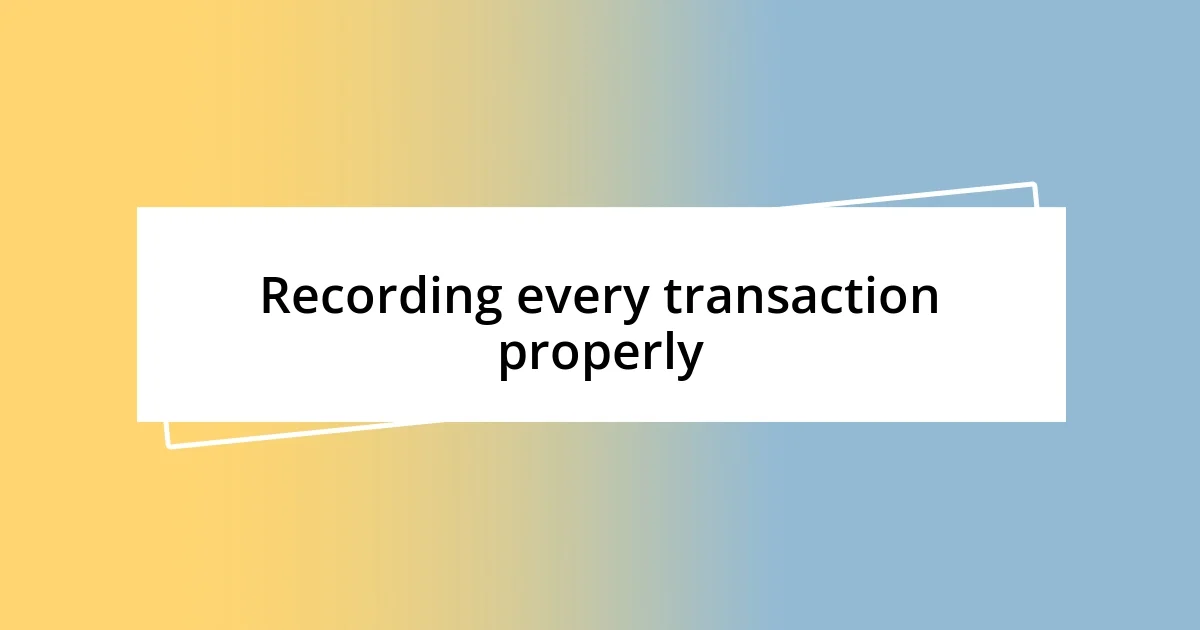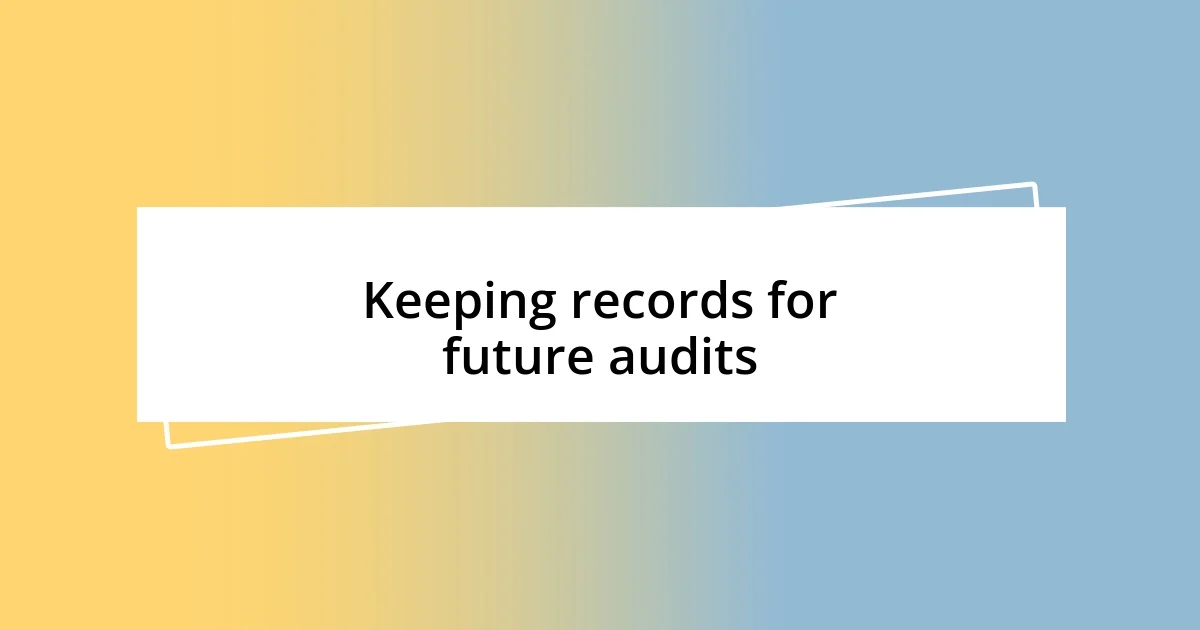Key takeaways:
- Understanding crypto tax obligations is crucial; failing to report gains can lead to significant penalties.
- Choosing the right tracking tools simplifies tax management and ensures accurate recording of each transaction.
- Implementing strategies like tax-loss harvesting and maximizing deductions can significantly reduce tax liabilities.

Understanding crypto tax obligations
When it comes to crypto tax obligations, it’s essential to understand that the rules can vary significantly depending on where you live. I still remember my initial confusion when I first discovered that the IRS treats cryptocurrencies like property, meaning that each sale or exchange could trigger a taxable event. Have you ever felt overwhelmed by the idea of tracking every single trade? Trust me, you are not alone.
Many people, myself included, have learned the hard way that failing to report crypto gains can lead to some serious repercussions. For instance, I had a friend who neglected to report a small gain from a trade, thinking it was insignificant. The next thing he knew, the tax authorities were knocking at his door, resulting in hefty penalties. Understanding your obligations isn’t just about avoiding fines; it’s about being proactive in your financial journey.
The emotional weight of tax season can feel like a cloud hanging over your head, especially when you’re juggling multiple coins and trades. Reflecting on my own experience, I found that developing a systematic approach to record-keeping eased my anxiety. It’s also worth asking yourself: How much time are you willing to invest in understanding your obligations? The more informed you become, the better prepared you’ll be, both financially and mentally.

Choosing the right tracking tools
Choosing the right tracking tools can make a world of difference in managing your crypto taxes effectively. I remember the early days when I tried to use a simple spreadsheet to track my transactions, and it quickly became a chaotic mess. It was frustrating trying to reconcile multiple wallets and exchanges without a good tracking solution. So, finding the right tool not only simplifies the process but can actually give you peace of mind.
When selecting a tracking tool, consider the following:
- User-Friendliness: Look for an interface that’s intuitive and straightforward. You don’t want to waste hours figuring out how to navigate the tool.
- Integration Options: Choose a tool that can sync directly with your wallets and exchanges; this saves a lot of manual data entry.
- Reporting Features: Ensure the software can generate reports that align with your local tax requirements.
- Customer Support: A responsive support team can help troubleshoot issues, which is invaluable come tax season.
- Price: There are free options, but often, the paid versions have more robust features that can save you time.
Taking the time to select the right tool can alleviate so much of the tax season stress I used to feel. The clarity and structure it provides make the entire process feel manageable, allowing me to focus on my crypto investments instead of just tax figures.

Recording every transaction properly
Recording transactions properly is the backbone of effective crypto tax management. From my experience, I learned that each transaction—whether it’s a sale, exchange, or even a minor purchase—needs to be logged accurately. Initially, I underestimated how a small trade could impact my taxable income. I found out the hard way that overlooking any detail could lead to an incorrect tax report, which could raise red flags with tax authorities.
Moreover, staying organized is essential. I’ve created a system to record my transactions that combines both software tools and manual logs. It might seem tedious, but having a detailed record helps me reflect on my trading decisions and improves my overall strategy. Each entry tells a story and adds clarity to my financial situation. Have you thought about how your approach to recording transactions can influence your investment results?
To make things clearer, having a structured system like a comparison table can help visualize what types of information to track. Here’s a simple breakdown of the key details I find most useful when recording transactions:
| Transaction Type | Details to Record |
|---|---|
| Purchase | Date, Amount, Price per Coin, Fees |
| Sale/Exchange | Date, Amount, Sale Price, Fees, Profit/Loss |
| Income (Staking, Airdrops) | Date, Amount, Value at Receipt, Fees |

Calculation methods for crypto gains
Calculating crypto gains often involves a few different methods, each with its own nuances. Personally, I find the First-In, First-Out (FIFO) method straightforward. It assumes that the first coins I bought are the first ones sold, which can simplify tracking when I need to report profits or losses. However, I’ve also used the Specific Identification method, where I choose the specific coins for sale. This approach can be advantageous if certain coins have appreciated significantly—remembering the exact coins sold can lead to reduced taxable gains if I sell those that have lost value.
Another prominent method is Average Cost Basis, where I average the cost of all purchased coins over time. This method can make calculations a lot easier, especially if you’re trading frequently. I remember being overwhelmed with all my transactions, but once I started averaging, my calculations became much less of a headache. It’s important to understand that each method can lead to different tax outcomes, so it’s crucial to choose one that aligns with your overall trading strategy and tax situation.
Have you ever calculated your gains, only to realize you missed a few transactions? I’ve been there, and it was a wake-up call for me. Tracking gains accurately is essential, as it not only affects my tax liabilities but also informs me about my investment performance. I’ve learned to profitably embrace the process as part of my financial journey rather than seeing it as just another chore. Each method has its strengths, and I think the key is to find what resonates with your trading style.

Strategies for minimizing tax liabilities
One strategy I’ve found effective for minimizing tax liabilities involves utilizing tax-loss harvesting. Essentially, this means selling underperforming assets to offset gains from successful transactions. When I had a few coins that weren’t performing well, I sold them not just to cut losses, but to reduce the tax I owed on my profitable trades. It’s like a double win—clearing up my portfolio while making my tax situation a bit more manageable. Have you ever considered how letting go of certain investments could actually work in your favor during tax season?
Another approach I take is keeping a close eye on holding periods. Long-term capital gains are typically taxed at a lower rate than short-term ones. Reflecting on my own transactions, when I made a conscious effort to hold some of my coins for over a year, it led me to save significantly on taxes. It was a game changer for me, reminding me to look beyond quick profits and think long-term. Have you thought about how timing can really affect your tax outcomes?
I also try to maximize deductions wherever possible. For instance, any fees associated with trading, like exchange fees or wallet maintenance charges, can often be deducted from my taxable income. This was a detail I initially overlooked, but once I started adding up those costs, I realized how much they could lower my tax bill. It’s surprising how the smaller details can add up to a significant difference, right? Have you been keeping track of all your trading-related expenses?

Filing your crypto taxes correctly
Filing crypto taxes correctly can feel daunting, but I’ve learned that organization is key. I make sure to keep detailed records of each transaction, including dates, amounts, and the purpose of the trades. One year, I almost panicked when I realized I didn’t have all my receipts, but creating a simple spreadsheet helped me see everything at a glance. Have you ever tried organizing yours? It really can ease the mental load during tax season.
When it comes time to file, I recommend using tax software that specializes in crypto transactions. I remember the first year I used one—it made a world of difference by automatically calculating my gains and losses. The software also prompted me to input any deductions I might’ve otherwise forgotten. This detail sometimes goes overlooked, but those deductions can save you significant amounts. Isn’t it comforting to have technology on your side?
It’s essential to stay updated on any changes in tax laws related to crypto, too. There have been times when I felt confident about my reporting only to find out new regulations were in place. I wish I had spent a little more time reviewing the IRS guidelines each year. Are you staying informed? Understanding the landscape of crypto tax laws helps ensure that you don’t inadvertently run into trouble later.

Keeping records for future audits
Keeping meticulous records for future audits is more than just a good practice; it’s a necessary part of managing my crypto investments. I remember a time when I got a notification from the IRS specifying audits for crypto holders. It sent a shiver down my spine. I quickly realized that having a well-organized system would be crucial, so I started meticulously logging every transaction. This has helped me breathe easier knowing I’m prepared if the tax authorities come knocking. How would you feel if you had to explain your crypto dealings without a clear record?
I also found it incredibly helpful to document not just the transactions, but any correspondence with exchanges or relevant platforms. There was an incident where I had issues retrieving transaction history from an exchange, and having a digital paper trail saved me hours of stress. Now, any time I trade or want to check something from the past, I can refer back to my notes without a hitch. Isn’t it reassuring to have everything in one place when you need it?
Moreover, I’ve learned to store these records in a secure digital format, such as cloud storage, ensuring they’re safe yet accessible. It’s like having a digital safe that I can access anytime, anywhere. One particularly busy tax season, I could easily retrieve documents on my phone while at a coffee shop, avoiding the last-minute scramble many face. Do you have a system in place that makes this process smoother for you?














